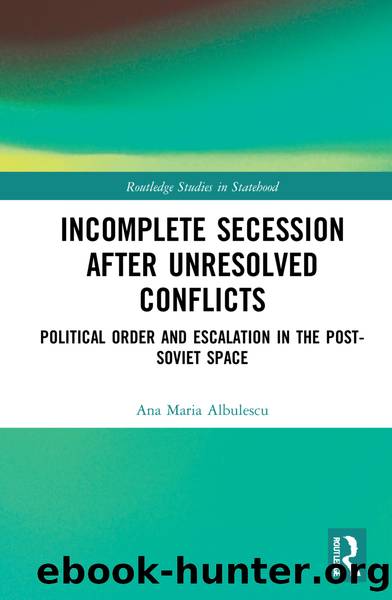Incomplete Secession After Unresolved Conflicts: Political Order and Escalation in the Post-Soviet Space by Ana Maria Albulescu

Author:Ana Maria Albulescu [Albulescu, Ana Maria]
Language: eng
Format: epub
Tags: International Relations, Intergovernmental Organizations, Russia & the Former Soviet Union, Peace, Political Science, Political Freedom, History, General
ISBN: 9781032048581
Google: xGtHEAAAQBAJ
Goodreads: 58217656
Publisher: Routledge
Published: 2021-10-11T00:00:00+00:00
The process of escalation and the exercise of authority in the security and governance functional domains
In the context of the current research it is important to point out that such statements were an integral part of the struggle for power between political elites in Georgia and Abkhazia, with the legislative bodies in both entities seeking to influence decisions related to conflict settlement that at the time were mainly negotiated between Shevardnadze and Ardzinba. The role of legislatures in both metropolitan and de-facto state is particularly important as they were a means of channelling nationalism and hard-line pressures from bellow to deliver the politics of secession and counter-secession. Indeed, as the previous section has emphasised, the statements of the Georgian Parliament with regards to Abkhazia were also directed against the indirect condemnation of the Abkhaz regime as being supported by the Russian Federation. Thus, they signalled incipient steps in the escalation from the level of intensity of antagonism of mutual accommodation to that of chronic stalemate as the re-emergence of nationalist political rhetoric in both metropolitan and de-facto state was meant to change the approach towards the negotiation of authority and the achievement of a constitutional deal in the context of the ongoing conflict resolution process.
Towards this end, at the beginning of 1998 the approach towards increasing confidence-building included the initiation of an assessment mission that would identify the needs of the population in the conflict zone with the view of designing specific projects that would generate progress in the area of governance and security (âRecord of the first extraordinary session of the Coordinating Council of the Georgian and Abkhaz parties,â 1998). Nevertheless, despite maintaining participation in the meetings of the Coordination Council, both Georgia and Abkhazia were concerned with consolidating their capacity for social and territorial control in the conflict zone. For Abkhazia this involved a process of institutional development that underpinned both the organisation of local self-governance elections as well as the adoption of a privatisation law and the creation of a Committee of State Property Management towards the implementation of this legislation (United Nations Security Council (UNSC), 1998b). This decision was criticised by the Georgian Parliament and subsequent actions by the Georgian authorities signalled the willingness of political elites in the metropolitan state to seek changes in the in the interactions with the de-facto state through the consolidation of their presence in the conflict zone. At the time this was evidenced by the demonstrations organised by Georgian political parties and IDPs and refugees demanding further actions towards the resolution of the conflict as well as the withdrawal of the CIS peacekeeping force (United Nations Security Council (UNSC), 1998b).
In May 1998, the Abkhaz Government in exile was moved from by the Georgian government from Tbilisi to Zugdidi with the purpose of gaining more control over the Abkhaz border and coordinating humanitarian assistance and the situation of IDPs. Further actions by the Georgian government involved the raising of the Georgian flag in the Gali District with the purpose of establishing a âliberated zoneâ in Abkhazia.
Download
This site does not store any files on its server. We only index and link to content provided by other sites. Please contact the content providers to delete copyright contents if any and email us, we'll remove relevant links or contents immediately.
The Secret History by Donna Tartt(19092)
The Social Justice Warrior Handbook by Lisa De Pasquale(12191)
Thirteen Reasons Why by Jay Asher(8912)
This Is How You Lose Her by Junot Diaz(6889)
Weapons of Math Destruction by Cathy O'Neil(6281)
Zero to One by Peter Thiel(5802)
Beartown by Fredrik Backman(5759)
The Myth of the Strong Leader by Archie Brown(5509)
The Fire Next Time by James Baldwin(5448)
How Democracies Die by Steven Levitsky & Daniel Ziblatt(5219)
Promise Me, Dad by Joe Biden(5154)
Stone's Rules by Roger Stone(5088)
A Higher Loyalty: Truth, Lies, and Leadership by James Comey(4964)
100 Deadly Skills by Clint Emerson(4927)
Rise and Kill First by Ronen Bergman(4790)
Secrecy World by Jake Bernstein(4753)
The David Icke Guide to the Global Conspiracy (and how to end it) by David Icke(4720)
The Farm by Tom Rob Smith(4514)
The Doomsday Machine by Daniel Ellsberg(4490)
